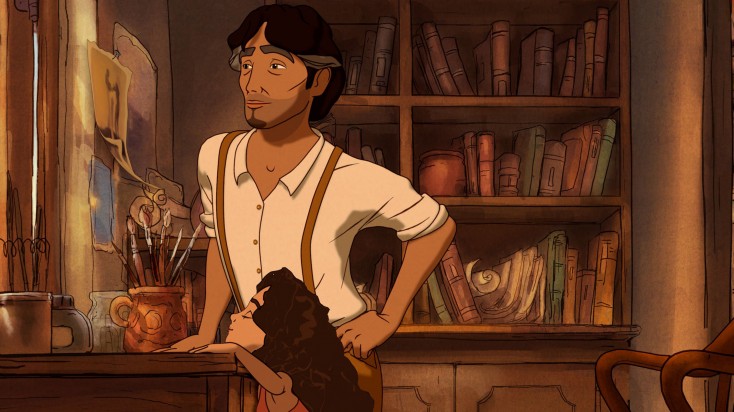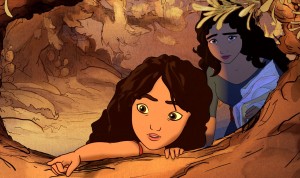By ANGELA DAWSON
Front Row Features
HOLLYWOOD—“I have seen distress around the world and sometimes it makes you lose hope,” laments Emmy award-winning actress Salma Hayek, who has traveled the globe as a humanitarian supporting causes ranging from raising awareness of violence against women to promoting breastfeeding to fighting hunger.
As a way of combating that feeling of helplessness, the Lebanese-Mexican actress decided she needed to bring Kahlil Gibran’s bestselling “The Prophet,” a collection of remarkable poetry, to the big screen, to inspire hope.
Just as she championed bringing the life story of controversial Mexican artist Frida Kahlo to the screen in 2002, the Academy Award nominated actress and Emmy winner (“Ugly Betty”) pressed hard to get “The Prophet” made.
Directed by Roger Allers (“The Lion King”), the film uses various animation styles of different artists to illustrate Gibran’s inspiring poetry, intercut with the story of an imprisoned poet, who faces danger from those in power who fear his influence on the oppressed masses who admire him. When he is offered freedom in exchange for renouncing his work, the poet stands firmly by his ideals. In his final hours of captivity, he is befriended by a mute little girl who is the daughter of his hard-working housekeeper at the small remote hut where he has been held on house arrest for several years. Despite his captivity, he has continued to write about love and hope, good and evil, death and freedom, and serve as a beacon of hope for his faithful followers.
Pulling together a talented group of animators included renowned artists George Plympton and Tomm Moore, and an all-star voice cast including Liam Neeson, John Krasinski, Frank Langella, Alfred Molina and Oscar nominee Quvenzhane Wallis (“Beasts of the Southern Wild”), the animated feature is aimed at viewers of all ages. The film features music from Damien Rice, Glen Hansard and Yo-Yo Ma.
Serving as a producer as well as the voice of the housekeeper, Kamila, Hayek is clearly pleased that she has triumphed in bringing Gibran’s beloved work to the screen. The film is being distributed through GKIDS Films. The petite actress speaks passionately about getting the film made and why she believed it was essential to bring Gibran’s work to a whole new generation through the medium of animation.
Q: What made you want to make this movie?
Hayek: I wanted to make a film that inspired people. Not just inspire, but made people want to go to have entertainment and somehow this beautiful thing we have inside—all of us—would have a place to come to the surface. That we can remember that there is this place inside us that exists.
I wanted some kind of distraction that actually connected you to life and made you feel excited about it. It was hopeful and uplifting. I wanted to make a film that was about connection. Today, when we think about connection, especially the younger generation, we think of the Internet. I wanted first, of course, for you to connect with your own humanity and then also to connect to others, starting with our families.
This is a movie that, if you watch it with your children, or with your teenagers, or with your parents or your grandparents, everybody’s going to have an intimate experience with it. When you come out, everybody wants to talk about his or her experience with the film.
Q: Why did you decide to make it an animated film?
Hayek: Animation is a great entry into freedom. The film combines poetry, art, painting, drawing, music, and filmmaking because the structure of the story of comes from the cinematic structure of telling the story.
I think that also the fact that we did not make it all the same kind of art. It’s honoring the theme of freedom. Every single animator had complete freedom to create whatever he or she wanted and interpret the poem how they wanted. We did not interfere. We chose them from all over the world. They come from different religions, different ages. They are men and women who bring their own perspective and they do it through art in a way that you get to be free. You also get to be free because you are surprised every time (a new chapter begins) and you don’t know what to expect because there’s going to be a new (artist).
It forces your brain to be malleable and open, and then you understand a story. We then take you out of the story and we give you information visually and through poetry and through music—but it’s yours. It’s for you to decide what to do with it. It’s sort of like you take a journey inside yourself.
Q: Can you talk about the first time you read “The Prophet?”
Hayek: Yes. It was a personal thing with my grandfather. I discovered the book on his bedside table and then he died when I was six. I was haunted by the image on the cover. I found it again when I was like 18 or 19 and I read it. To me it was like, “Oh my grandfather is talking to me. He is teaching me about who he was and about life.” It was so personal, and then I realized more than 120 million around the world also felt like someone was talking to them too, and they use (verses from it) when they get married and for different occasions.
At the time I didn’t understand most of it, but there were things that stood out. I think it’s phenomenal because (Gibran) talks about the simple things in life that brings us all together. This is why I think it’s embraced by all religions and nationalities. There are just the simple things to be grateful for—food, love, death. Why not be excited about death? Because there is something beyond (and) we are more than just our bodies. I think that when people read it, there’s always a phrase, you’re not supposed to understand or like the whole point, that feels comforting and familiar. You’ve heard it before but you don’t know where. That’s not your brain talking to you, that is your instincts telling you (that) this is true.
I think that throughout the years, I have been able to recognize different phrases. Even though I’ve watched the film 100 times, I’m not bored of it. It reminds me of different conflicts in my life, and I think this is part of the magic of the words.
Q: Does your daughter Valentina like it?
Hayek: Yes, but my daughter was resentful and jealous of the film, at first. For most of her life, (she felt) mommy was not paying enough attention to her because she was working on it. You have to remember I was doing this from Europe and everybody was on American time so there were many nights when I was not sleeping, not taking her to school in the morning because I was working until 5 a.m. It was really difficult to make this movie. It was such a nightmare. It was the hardest thing I’ve ever done.
So when she saw a little piece of the main story, she said, “Nobody is going to watch that film. You know that. It looks old.” But when she went to see the entire film, I remember on her way (to the screening) she said to me, “Are you going to be angry if I don’t like it? Am I supposed to say I like it even if I don’t like it?” I said, “No, I want you to tell me the absolute truth.”
She went to see it, and she came out, she was quiet. I said, “Did you like it? Tell me the truth.” And she said, “Mommy, I’m so proud of you.” And then she went home and she wrote a poem. What the poem said was that we are spirits. We cannot be incarcerated, not even by our own bodies. Because we are free, we are spirits and we’ll never die. Somehow, for my daughter, the film gave her some comfort in that really difficult concept.
Q: When things got frustrating during production, how did you push through?
Hayek: Honestly, it was just a sense of honor to just try to give the money back to the investors. The pressure of that has been immense because these people trusted me with something and it really mortified me that I may not be able to do it. But I learned a very big lesson when I went to Lebanon. At some point this movie was a disaster and it didn’t look like we were going to make it. We discovered there was some lies and there was some people covering their tracks and lying more and more. We were $8 million over budget. We had to invent a new form of animation and we had to do a lot of miracles.
So when I went to Lebanon to screen the film, I cannot describe to you what this meant for this country. The bankers that gave me the money from Lebanon, said to me, “You know what, it’s okay if it doesn’t make its money back.” You don’t normally hear bankers say that. They said this film goes beyond money. We have seen what this film has done to the spirit of this little country that is in such despair. It’s worth paying that and a lot more because we have not seen this kind of energy in this place for a long time. At this moment, I said, “You know what? Of course I’m going to keep going and I’m not going to worry. I’m going to keep trying because this is a contribution that I’m doing and I’m doing it with a good will and from a good place. I’m just going to do it the best that I can. Whatever the end result is, I know I did it with a good intention and that I did my very best.”






